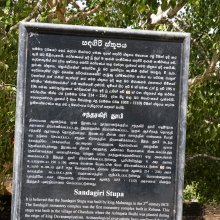Elu, Eḻu: 10 definitions
Introduction:
Elu means something in Hinduism, Sanskrit, Jainism, Prakrit, biology, Tamil. If you want to know the exact meaning, history, etymology or English translation of this term then check out the descriptions on this page. Add your comment or reference to a book if you want to contribute to this summary article.
Images (photo gallery)
In Hinduism
Vyakarana (Sanskrit grammar)
Source: Wikisource: A dictionary of Sanskrit grammarElu (एलु).—Tad-affix चेलु (celu) in the sense of unable to bear, found in Vedic Literature only; e.g. हिमेलुः (himeluḥ) cf. हिमाक्चेलुर्वक्तव्यः । (himākcelurvaktavyaḥ |) P.V.2.122 Vārt. 7.

Vyakarana (व्याकरण, vyākaraṇa) refers to Sanskrit grammar and represents one of the six additional sciences (vedanga) to be studied along with the Vedas. Vyakarana concerns itself with the rules of Sanskrit grammar and linguistic analysis in order to establish the correct context of words and sentences.
Purana and Itihasa (epic history)
Source: archive.org: Puranic EncyclopediaElu (एलु).—This word in Malayālam means 'Seven'.
The seven qualities which would enhance prosperity are the following: Dhairya (courage), Śama (forbearance), Dama (control of the sense), Śucitva (cleanliness), Dayā (compassion), Mṛduvāk (geniality of speech) and Ahiṃsā (not giving injury to your friends). (See full article at Story of Elu from the Puranic encyclopaedia by Vettam Mani)

The Purana (पुराण, purāṇas) refers to Sanskrit literature preserving ancient India’s vast cultural history, including historical legends, religious ceremonies, various arts and sciences. The eighteen mahapuranas total over 400,000 shlokas (metrical couplets) and date to at least several centuries BCE.
Biology (plants and animals)
Source: Google Books: CRC World Dictionary (Regional names)1) Elu in India is the name of a plant defined with Azima tetracantha in various botanical sources. This page contains potential references in Ayurveda, modern medicine, and other folk traditions or local practices It has the synonym Monetia barlerioides L’Hér. (among others).
2) Elu in Nigeria is also identified with Philenoptera cyanescens It has the synonym Robinia cyanescens Schumach. & Thonn. (etc.).
Example references for further research on medicinal uses or toxicity (see latin names for full list):
· Ethnobotanical Leaflets (2008)
· Journal of Ethnopharmacology (1997)
· Flore de Madagascar et des Comores (1946)
· Journal of the Linnean Society, Botany (1860)
· Annals of the East Cape Museums (2000)
· Nova Genera et Species Plantarum (1824)
If you are looking for specific details regarding Elu, for example health benefits, diet and recipes, extract dosage, chemical composition, side effects, pregnancy safety, have a look at these references.

This sections includes definitions from the five kingdoms of living things: Animals, Plants, Fungi, Protists and Monera. It will include both the official binomial nomenclature (scientific names usually in Latin) as well as regional spellings and variants.
Languages of India and abroad
Sanskrit dictionary
Source: Cologne Digital Sanskrit Dictionaries: Edgerton Buddhist Hybrid Sanskrit DictionaryElu (एलु).—m. or f., a high number: Mahāvyutpatti 7888 (eluḥ, = Tibetan yal, or ya lad), cited from Gaṇḍavyūha which reads elā or delu (nt.) qq.v.
Source: Cologne Digital Sanskrit Dictionaries: Monier-Williams Sanskrit-English DictionaryElu (एलु):—n. a particular number, [Buddhist literature]
Source: DDSA: Paia-sadda-mahannavo; a comprehensive Prakrit Hindi dictionary (S)Elu (एलु) in the Sanskrit language is related to the Prakrit word: Elu.
[Sanskrit to German]
Sanskrit, also spelled संस्कृतम् (saṃskṛtam), is an ancient language of India commonly seen as the grandmother of the Indo-European language family (even English!). Closely allied with Prakrit and Pali, Sanskrit is more exhaustive in both grammar and terms and has the most extensive collection of literature in the world, greatly surpassing its sister-languages Greek and Latin.
Prakrit-English dictionary
Source: DDSA: Paia-sadda-mahannavo; a comprehensive Prakrit Hindi dictionaryElu (एलु) in the Prakrit language is related to the Sanskrit word: Elu.
Prakrit is an ancient language closely associated with both Pali and Sanskrit. Jain literature is often composed in this language or sub-dialects, such as the Agamas and their commentaries which are written in Ardhamagadhi and Maharashtri Prakrit. The earliest extant texts can be dated to as early as the 4th century BCE although core portions might be older.
Kannada-English dictionary
Source: Alar: Kannada-English corpusElu (ಎಲು):—[noun] any of the pieces of hard tissue that make up the skeleton of a vertebrate animal, and consist largely of calcium phosphate or carbonate in a matrix of collagen fibres; a bone.
--- OR ---
Elu (ಎಲು):—[noun] brightness; brilliance; splendour.
--- OR ---
Ēlu (ಏಲು):—[verb] to be hanging loosely; to be dangling.
--- OR ---
Ēḷu (ಏಳು):—
1) [verb] to get up; to stand up (from the sitting position).
2) [verb] to come out of sleep or a state similar to sleep, stupor, trance etc.; to wake up.
3) [verb] to recover from unconsciousness, stupor or disease.
4) [verb] to become alert, vigilant or careful.
5) [verb] ಎದ್ದಾಡು [eddadu] eddāḍu to jump (in joy); ಎದ್ದಾಸರು [eddasaru] eddāsaru intense desire or need for water caused by dryness in the mouth and throat; ಎದ್ದಾಳು [eddalu] eddāḷu a tall person; 2. a person of importance, good social status; 3. a person who is conspicuous in a gathering by some particular or peculiar physical characteristics, ಎದ್ದುಕಾಣಿಸು [eddukanisu] eddu kāṇisu to be projecting out (as from with a plain surface); 2. to be attracting attention by being unusual, outstanding; to be striking, prominent or conspicuous; ಎದ್ದುಕಾಣು [eddukanu] eddu kāṇu = ಎದ್ದುಕಾಣಿಸು [eddukanisu]; ಎದ್ದರೆ ಜುಟ್ಟು ಹಿಡಿ, ಬಿದ್ದರೆ ಕಾಲು ಹಿಡಿ [eddare juttu hidi, biddare kalu hidi] eddare juṭṭu hiḍi, biddare kālu hiḍi (prov.) to have dual value systems; to be arrogant while in a favourable position, but to be humble when humiliated; ಏಳು ಅನ್ನೋ ಜಾಗದಲ್ಲಿ ಕೂಡಬಾರದು [elu anno jagadalli kudabaradu] ēḷu annō jāgadalli kūrbāradu (prov.) stay not where you do not get respect.
--- OR ---
Ēḷu (ಏಳು):—
1) [noun] the act or an instance of going up; a rise.
2) [noun] ಏಳುಬೀಳು [elubilu] ēḷuīḷu the act or fact of going alternately up and down; 2. (in pl.) good and bad periods; prosperity and down fall; ups and downs; growing stronger and weaker alternatively.
--- OR ---
Ēḷu (ಏಳು):—[adjective] totalling one more than six; seven.
--- OR ---
Ēḷu (ಏಳು):—
1) [noun] the cardinal number seven; 7.
2) [noun] ಏಳುಹನ್ನೊಂದಾಗು [eluhannomdagu] ēḷuhannondāgu (ruin, ravage, loss, etc.) to happen; 2. to become very difficult; ಏಳರಾಟ [elarata] Eḷarāṭa (astrol.) the agonising period of seven and half years caused by the planet Saturn being in an unfavourable position; ಏಳೆರಡು [eleradu]1 ēḷerḍu amounting to fourteen; ಏಳೆರಡು [eleradu]2 ēḷerḍu the cardinal number fourteen; 14; ಏಳುಕೆರೆಯ ನೀರುಕುಡಿ [elukereya nirukudi] ēḷukereya nīru kuḍi (fig.) to go from town to town in pursuit of one’s livelihood; to struggle hard; 2. (fig.) to get the real experience of hard life; ಏಳುಕೆರೆಯ ನೀರುಕುಡಿಸು [elukereya nirukudisu] ēḷu kereya nīrukuḍisu to make another’s life miserable; to trouble; to annoy; ಏಳನೇ ತಿಂಗಳಿನಲ್ಲಿ ಹುಟ್ಟಿರು [elane timgalinalli huttiru] ēḷanē tiŋgaḷinalli huṭṭiru (fig .) to hasten always with little thought (as an inborn quality of one’s personality).
--- OR ---
Ēḻu (ಏೞು):—[adjective] totalling one more than six; seven.
--- OR ---
Ēḻu (ಏೞು):—[noun] the cardinal number seven; seven; 7.
Kannada is a Dravidian language (as opposed to the Indo-European language family) mainly spoken in the southwestern region of India.
See also (Relevant definitions)
Starts with (+172): Elu aredudu, Elu-nilaimatam, Elu-penparuvam, Elu-potti, Elu-vakaialavai, Eluaai, Eluai, Elubaeg, Elubasa, Elubesana, Elubu, Elubugai, Elubugamti, Elubumajje, Elucci, Eluccikkannovu, Eluccikkoti, Eluccikottu, Elucciyilai, Eluda.
Ends with (+240): Ada pelu, Adigelu, Adimelu, Agaduhelu, Agelu, Aimselu, Ainselu, Aiselu, Alamelu, Aleyelu, Anatigelu, Anukelu, Arane beelu, Arane-beelu, Arelu, Arikelu, Arthavelu, Aselu, Attupelu, Badiyelu.
Full-text (+52): Elugu, Ugu-elu, Elu aredudu, Eluvu, Edamaggulu, Elunuru, Iralittivu, Delu, Elukalam, Kukkadi, Himelu, Elumunivar, Dombi, Elu-potti, Ela, Elunarakam, Pukaivattam, Kutacalam, Elunayiru, Peru-kilvattam.
Relevant text
Search found 13 books and stories containing Elu, Ēlu, Ēḷu, Ēḻu, Eḻu; (plurals include: Elus, Ēlus, Ēḷus, Ēḻus, Eḻus). You can also click to the full overview containing English textual excerpts. Below are direct links for the most relevant articles:
Diaspora of Bhuta (Daiva) worshipping cult—India and Indonesia (by Shilpa V. Sonawane)
Part 12 - Submerged Lands in Ancient Indian Literture < [Chapter 4 - Inter-Disciplinary Analysis]
Tiruvaymoli (Thiruvaimozhi): English translation (by S. Satyamurthi Ayyangar)
Pasuram 2.7.1 < [Section 7 - Seventh Tiruvaymoli (kecavan tamar)]
Pasuram 1.3.9 < [Section 3 - Third Tiruvaymoli (Pattu utai Atiyavar)]
Pasuram 2.6.7 < [Section 6 - Sixth Tiruvaymoli (Vaikunta Manivannane)]
Later Chola Temples (by S. R. Balasubrahmanyam)
Chapter VII - Rajaraja II (a.d. 1146 to 1172)
Temples in Nagar < [Chapter X - Temples of Rajadhjraja II’s Time]
Temples in Kendatti < [Chapter VIII - Temples of Rajaraja II’s Time]
The Chaldean account of Genesis (by George Smith)
Mahavamsa (by Wilhelm Geiger)
Puranic encyclopaedia (by Vettam Mani)





